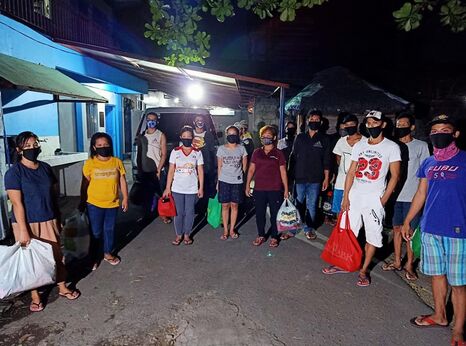Protesters seeking relief to be arraigned

According to the group Save San Roque Alliance, on 1 April 2020, residents of San Roque village in Quezon City gathered along a portion of EDSA – a major highway in Metro Manila – upon receiving news that relief items were to be distributed there. When the distribution didn’t happen, the residents stayed in the area to stage a protest to demand relief from the Quezon City government.
Members of the police supposedly asked the residents to leave the area and then, according to reports from civil society organizations and the police, resorted to force to disperse the protest and arrested those who refused to leave. The Save San Roque Alliance maintains that the police violently dispersed the protesters and hit people with wooden sticks. Amnesty International spoke to one leader of the group who said that victims included a man and his child, who were in the area to collect financial aid from his company whose office was also along EDSA.
A total of 21 protesters were detained at the headquarters of the Quezon City police. According to a group leader, relatives were prevented from talking or delivering food to them following several hours of detention. Five days later, on 6 April 2020, the 21 individuals were released after posting bail amounting to PhP 367,500 (USD 7,254) that was raised through donations. They face charges of “unlawful assembly”, “resistance to authority”, “spreading false information”, “non-cooperation in a health emergency” and “impeding road access”.
International human rights law allows for limitations on the right to peaceful assembly for the protection of public health, but restrictions need to be necessary and proportionate. In that sense, police must apply non-violent means before resorting to the use of force, which may be used only if other means have proven to be, or are likely to be, ineffective. Moreover, the absolute prohibition of torture and other ill-treatment is non-derogable, even at times of emergency.
Therefore, individuals should not be imprisoned solely for breaching restrictions imposed in the context of the COVID-19 pandemic. The implementation of fines can also have particularly adverse effects on specific groups, even if provisions are presented in neutral terms. In considering the application of fines for violating the conditions of the restrictions imposed, authorities must take into account the circumstances of groups at risk who may be disproportionately affected and consider alternatives to alleviate the disproportionate impact of fines.
The residents said they launched the protest after they did not receive any form of relief from the government. The local government of Quezon City has disputed this, and said that while relief distributions were ongoing, it will review the list of recipients to ensure no one is left out. In responding to COVID-19, the government has promised P200-billion cash aid for the poor, many of whom have lost their means of income under the lockdown. The cash aid includes provision of a monthly allowance of USD 100-158 to those in need, but the distribution has been riddled with delays and other alleged anomalies. On 19 June 2020, the government said nearly 300 local officials were being investigated for these anomalies and may face charges.